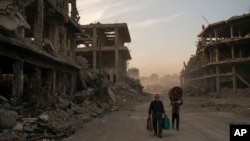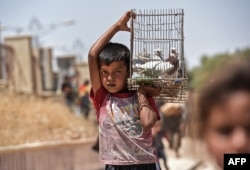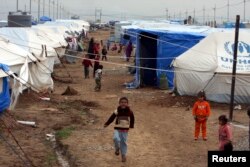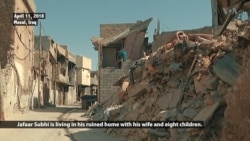Hundreds of displaced Iraqis who returned to their homes after the defeat of the Islamic State are now going back to Kurdish refugee camps, due to a lack of services and an impasse in reconstruction, Kurdish and Iraqi officials said.
Falah Mustafa Bakir, the Kurdistan region's foreign relations minister, has announced that about 4,000 displaced civilians mostly from Nineveh province, who went back to their homes after the Iraqi victory over IS last year, have returned to Kurdish refugee camps since January.
"What we are seeing this year is a reverse return to the Kurdistan region," Bakir said Tuesday during a joint press conference with Ramanathan Balakrishnan, the U.N. Population Fund representative in Irbil, the capital of Iraq's Kurdistan region.
"The return of internally displaced and refugees requires work on ensuring security, providing basic services, and creating job opportunities, in addition to efforts for a national reconciliation," Bakir added.
With the Kurdish region facing a major financial crisis, Bakir pleaded for international aid, adding that the internally displaced and refugees have become a heavy financial burden on Irbil.
The region currently hosts 1.1 million displaced Iraqis and nearly 250,000 Syrian refugees who fled violence over the years. The U.N. agency is seeking $156 million in financial support to help provide services to people in refugee camps.
Star Newroz, a spokesperson for the Iraqi ministry of migration and displaced, said those who returned to refugee camps were mostly from areas far from Mosul where the Iraqi government had difficulty reaching out to certain areas to provide basic services.
He said only about 40 Iraqi families have been reported as leaving their homes to go back to refugee camps.
"They are leaving due to logistical reasons, either because their homes are far from the center of the province and services, or their homes are completely destroyed and unlivable," he told the Iraqi Shafaaq news agency.
Iraqi forces recaptured Mosul from IS in July 2017 and declared victory over the terror group in December.
The victory came at a heavy price for Iraq. Months of IS occupation, and the Iraqi battle to oust the terror group, left thousands of people dead, millions of others displaced, and great destruction.
In Mosul alone, the U.N. has estimated that nearly 40,000 buildings need to be rebuilt or restored.
The historical district of Mosul, locally known as the Old City, remains a pile of rubble months after the removal of IS.
Slow reconstruction
An assessment last year by the U.N. Human Settlements Program estimated 5,390 of the 8,400 housing sites destroyed or severely damaged in Mosul were located in the Old City.
Now, more than eight months since the removal of IS, reconstruction remains slow and disappointing for residents.
Those who returned said a lack of basic services, particularly water, electricity and job opportunities, remain the main burden for restarting life. Many preferred living in refugee camps, where they at least did not have to worry about those provisions.
WATCH: Old Mosul District's Sole Returned Family Lives in Crumbling Home
With general elections to be held in May, the current Iraqi government said it is doing its best to stabilize and reconstruct the recaptured areas. But it said it cannot handle the damage without international support.
In February, an international conference in Kuwait collected about $30 billion, mostly in credit and investments, to help rebuild Iraq's economy and infrastructure. However, that amount fell far short of Prime Minister Haider al-Abadi's expectation of $90 billion for infrastructure and recovery after IS.








